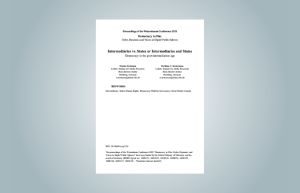 In ihrem Konferenzpapier schreiben Martin Fertmann und Prof. Dr. Matthias C. Kettemann über Intermediäre und Meinungsfreiheit. Das Konferenzpapier wurde als Open Access Publikation veröffentlicht.
In ihrem Konferenzpapier schreiben Martin Fertmann und Prof. Dr. Matthias C. Kettemann über Intermediäre und Meinungsfreiheit. Das Konferenzpapier wurde als Open Access Publikation veröffentlicht.
Auszug
Humans are social beings. We experience ourselves through others. A lot of communication has now moved to online spaces. As the European Court of Human Rights put it in 2015, the internet provides “essential tools for participation in activities and discussions concerning political issues and issues of general interest” (ECHR 2015). In that sense, it is well accepted that “the internet plays a particularly important role with respect to the right to freedom of expression” (Committee of Ministers of the Council of Europe 2018), and that this role relies on private intermediaries’ digital platforms that not just regulate access to the online communication space, but constitute – through their rules – large parts of it (Kettemann/Schulz 2020). Given the normative frame for online communication is thus to a large extent defined by private actors, how can states, citizens and users influence the rules which determine the limits of what may be said online?
Fertmann, M.; Kettemann, M. C. (2021): Intermediaries vs. States or Intermediaries and States: Democracy in the Post-Intermediation Age. In: Proceedings of the Weizenbaum Conference 2021. Berlin: Weizenbaum Institute for the Networked Society – The German Internet Institute, S. 1-4. https://doi.org/10.34669/wi.cp/3.19

